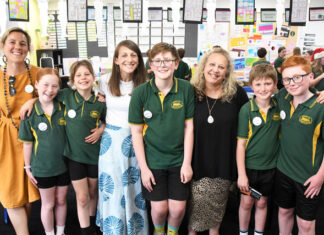The tall, exotic man who walked into Kathleen McAleer’s office at Casey Council in 2006 stood out in the queue. He had been in Australia long enough to know where to find help and not long enough to achieve his dream without it.
Kathleen remembers that day as a highlight of her career as Casey’s access and equity officer.
The man, Mohammed Mougadem, had received a letter from his ward councillor welcoming him to Casey, and a few weeks earlier he had received citizenship.
He was one of only 200 people in Australia from the beautiful Nuba mountains in northern Sudan. He wanted to set up a community group.
New arrivals know that in every town council there is someone like Kathleen who understands the plight of a stranger in a strange land.
Thus Kathleen and Mohammed became friends in their efforts to reduce the isolation and loneliness of Mohammed’s people far from their extended families.
He became a leader in Doveton, started a performance troupe, and helped the council introduce bus tours for African families to learn about their new home.
“It astounds me to see how much people can achieve in just a few years after arriving with nothing, not even English language,” Kathleen says.
Hundreds of people seek out Kathleen and the equity team at Casey Council. They include new refugees as well as Australia’s oldest inhabitants, the indigenous people, the elderly, and people with disabilities.
Arriving herself in Australia from Glasgow in 1973 with husband Danny, Kathleen knew the feeling of being far away from home.
“Migration is a sad thing, but a lot of good can come out of it,” she says.
With a large family, the McAleers themselves struggled to settle in Australia, and in 1988 returned to Scotland, only to head back again six months later.
Kathleen had worked in community childcare from the start, first at Elwood and then at Doveton, before completing an associate diploma of welfare studies at Monash University in Gippsland.
She funded her studies with a small income from providing family day care at Dandenong. During this time she assisted with the establishment of the South Eastern Region Migrant Resource Centre, a life-changing opportunity, she says.
The Department of Immigration and the City of Berwick, as it was then, had started to notice her.
“A six-month project to look at the needs of migrants, just temporary and suitable for a graduate, came up in Berwick in 1993.
“I saw this as a great opportunity for a mature graduate with a large family.”
Sixteen years later, Kathleen is still there. Now she oversees aspects of the equity program at Casey, and she is on the advisory committee of Southern Health, the agency that took over Doveton Hallam Community Health Service where Kathleen served on the board in the early 1980s.
These days she conducts research, implements policies, creates inclusive communities, removes barriers to disadvantaged groups, and supervises some of the city’s community development staff.
“I am proud to have been the person doing this kind of work for so long.”
To earn a living, Kathleen need not have devoted so much of her life to others, because from her Irish family heritage she brought one skill to Australia that turned out to be a successful business for her: Irish dancing, which she learned at age three.
Kathleen started the McAleer School of Irish Dancing in Hallam, which her daughter Fiona now runs in partnership with her. Kathleen became an accredited teacher and adjudicator in Dublin, and her children are champions.
“My grandparents came from Ireland to industrial Glasgow and had 11 children. We were all migrants even back then.
“Irish dancing is part of our family history and culture.”
Dancing brings her into contact with many families and provides a wider window to the community.
The dancing school extends Kathleen’s contacts with people. She feels the pulse of Casey’s cultural diversity every working day.
At a crucial time for expansion, the council has now set up a new community inclusion team including an indigenous officer, a disability access officer, and an ageing positively officer.
“There has particularly been increasing recognition of our indigenous history,” Kathleen says.
“The Dulin-Tjulali Tor just outside the civic centre in Narre Warren contains a statement of acknowledgement for all to see.
“Over the coming months, buses with indigenous guides will tour significant places across the municipality in a project called ‘A Casey Aboriginal Journey’.”
Now Kathleen and Danny are grandparents, and if the numbers of people in Casey needing access to services continues to increase there will be no shortage of work for her.
“The phone rings all the time.”
Get the latest news to your email inbox FREE!
REGISTER




